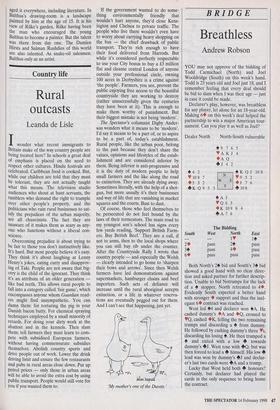Country life
Rural outcasts
Leanda de Lisle
Iwonder what recent immigrants to Britain make of the way country people are being treated here? In schools a great deal of emphasis is placed on the need to respect other cultures. Hindu festivals are celebrated. Caribbean food is cooked. But, while our children are told that they must be tolerant, they are not actually taught what this means. The television studio audiences who shout at hunt servants, the ramblers who demand the right to trample over other people's property, and the politicians who ruin rural businesses to sat- isfy the prejudices of the urban majority, are all chauvinists. The fact they are unaware of it makes them as scary as any- one who functions without a liberal con- science.
Overcoming prejudice is about trying to be fair to those you don't instinctively like. It's hard. But most people believe it's easy. They think it's about laughing at Lenny Henry's jokes, eating curry and disapprov- ing of Taki. People are not aware that big- otry is the child of the ignorant. They think it's an attribute of an older generation like bad teeth. This allows rural people to fall into a category called 'fair game', which encompasses anyone whom Guardian read- ers might find unsympathetic. You can damn them: for torturing the pig in your Danish bacon butty. For chemical spraying techniques employed by a small minority of retards. For doing your dirty work at the abattoir and in the kennels. Then slam them: tell farmers they must learn to com- pete with subsidised European farmers, without having commensurate subsidies themselves. Abolish country sports and drive people out of work. Lower the drink driving limit and ensure the few restaurants and pubs in rural areas close down. Put up petrol prices — only those in urban areas will be able to avoid the extra cost by using public transport. People would still vote for you if you wanted them to. If the government wanted to do some- thing environmentally friendly that wouldn't hurt anyone, they'd close Kens- ington and Chelsea to private traffic. The people who live there wouldn't even have to worry about carrying heavy shopping on the bus — the chief drawback of public transport. They're rich enough to have their food delivered from Harrods. But while it's considered perfectly respectable to use your City bonus to buy a £3 million flat and cleanse central London of anyone outside your professional circle, owning 100 acres in Derbyshire is a crime against `the people'. Farmers, you see, prevent the public enjoying free access to the beautiful countryside they are working to destroy (rather unsuccessfully given the centuries they have been at it). This is enough to make them worthy of punishment. But their biggest mistake is not being 'modern'.
The Spectator's columnist Digby Ander- son wonders what it means to be 'modern'. I'd say it means to be a part of, or to aspire to be a part of, today's establishment. Rural people, like the urban poor, belong to the past because they don't share the values, opinions and lifestyles of the estab- lishment and are considered inferior by them. Being inferior is anti-progressive and it is the duty of modern people to help small farmers and the like along the road to extinction. They are already dying away. Sometimes literally, with the help of a shot- gun, but more usually it's their businesses and way of life that are vanishing in market squares and the courts. Bust to dust.
Of course, those who feel themselves to be persecuted do not feel bound by the laws of their tormentors. The main road to my youngest son's school has signs every few yards reading, 'Support British Farm- ers. Buy British Beef.' They are a call, if not to arms, then to the local shops where you can still buy rib under the counter. After the Countryside Rally I wrote that country people — and especially the Welsh — clearly intended to go home to 'sharpen their bows and arrows'. Since then Welsh farmers have led demonstrations against supermarkets, hamburger chains and beef importers. Such acts of defiance will increase until the rural aboriginal accepts extinction, or a life in whatever reserva- tions are eventually pegged out for them. And I can't see that happening, just yet.
My mother's one of the Duvets.'

























































 Previous page
Previous page